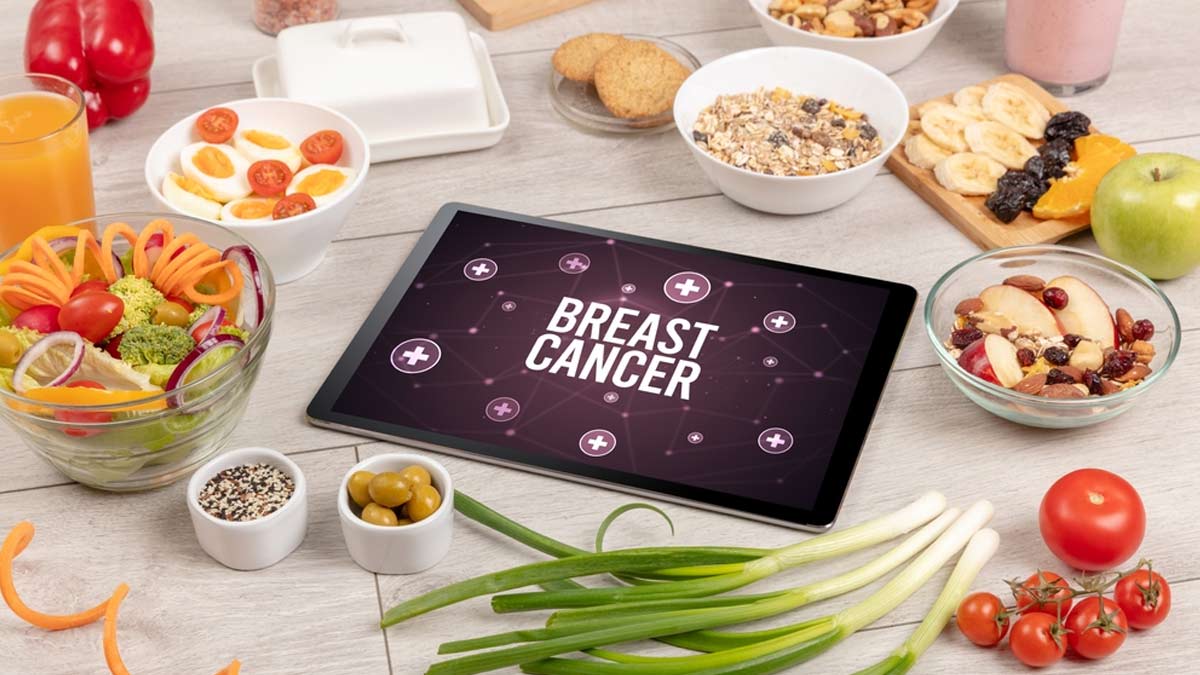
Breast cancer is one of the leading cancers worldwide, yet a lot of people give in to the misconceptions and stigmas that surround the disease. Many even lack the awareness that adopting a healthy lifestyle can help reduce the risk of breast cancer. Diet, in particular, is a key component in breast cancer prevention.
Table of Content:-
During this Breast Cancer Awareness Month, we at OnlyMyHealth shed light on the vital role a healthy diet plays in reducing the risk of breast cancer. Two leading experts will provide insights on the types of foods to include and avoid, along with essential lifestyle strategies to incorporate into daily routines.
Also Read: Rare, But Men Can Also Develop Breast Cancer: Expert Shares Who Is At Risk And Warning Signs
Dietary Factors That Can Make A Difference In Breast Cancer Prevention![]()
Several studies have highlighted how increasing rates of obesity, metabolic syndrome, and diabetes contribute to breast cancer risk. Studies have also explored the role of healthy lifestyle habits in breast cancer prevention.
According to a 2017 study published in the European Journal of Cancer Prevention, plant-based diets, particularly the Mediterranean and Okinawan diets, have shown potential benefits in reducing breast cancer risk.
While the Mediterranean diet is a way of eating that focuses on plant-based foods and healthy fats, the Okinawan diet is a traditional eating pattern from the Japanese island of Okinawa that focuses on low-calorie, plant-based foods.
Additionally, the study also emphasises the role of individual nutrients and dietary components, like energy density, fat, and fatty acids, in influencing breast cancer risk.
Specifying the foods people should consume to reduce their risk of breast cancer, Dr Priyanka Lakhwani, Breast Surgical Oncology, HCG Cancer Centre, Nagpur, listed:
- Eat more plant-based foods: Prioritise fruits, vegetables, whole grains, and legumes in your diet. Aim for at least five servings of fruits and vegetables each day.
- Focus on healthy fats: Replace saturated and trans fats with healthy fats, such as those found in nuts, seeds, avocados, and olive oil.
- Limit red and processed meats: Choose lean proteins like fish, poultry, and plant-based options, and minimise your intake of processed and red meats.
- Cut back on sugar and refined carbs: Opt for whole grains instead of white bread, sugary cereals, and other refined products that can spike insulin levels.
- Limit alcohol: Keep alcohol intake to a minimum to reduce the risk associated with oestrogen levels and breast cancer.
Dr Lakhwani further shared that antioxidants in fruits and vegetables, such as vitamins C and E, help protect cells from damage caused by free radicals, whereas omega-3 fatty acids, found in fatty fish and flaxseeds, reduce inflammation and may lower cancer risk.
She added that fibre from whole grains and legumes aids in hormone regulation, helping to reduce oestrogen levels, whereas calcium and vitamin D support healthy breast tissue and may protect against cancer. Moreover, isoflavones in soy products can help balance hormone levels, potentially reducing the risk of hormone-driven breast cancers.
Foods That Can Help Reduce Breast Cancer Risk![]()
Dr Mangesh P. Kamath, Additional Director, Medical Oncology, Fortis Hospital, Cunningham Road, Bengaluru, recommended focusing on whole, plant-based foods, which include leafy greens, cruciferous vegetables (broccoli, kale), berries, and other fruits.
He added, “Whole grains, nuts, and seeds (flax, chia) are also beneficial. Healthy fats from avocado, olive oil, and fatty fish (salmon, sardines) support breast health. Limit processed and high-calorie foods.”
Also Read: Dense Breasts Are A Risk Factor For Breast Cancer: What Do Dense Breasts Mean?
Why Maintaining A Healthy Weight Is Crucial
According to Dr Kamath, maintaining a healthy weight reduces breast cancer risk, particularly after menopause. This is because excess body fat leads to increased oestrogen levels, which can stimulate tumour growth.
A research article published in Scientific Reports found that with each 5 kg/m2 increase in BMI, there was a 31% higher risk of breast cancer among women.
Dr Kamath therefore recommended aiming for a BMI between 18.5 and 25 through a balanced diet and regular exercise.
Other Lifestyle Changes That Can Reduce The Risk Of Breast Cancer![]()
In addition to a healthy diet, lifestyle factors like exercise and moderate alcohol consumption significantly contribute to breast cancer prevention, said Dr Lakhwani.
She explained, “Regular physical activity helps maintain a healthy weight, reducing levels of oestrogen and insulin, both linked to breast cancer risk. Exercise also boosts immune function and reduces inflammation, providing added protection. Alongside a diet rich in fruits, vegetables, fibre, and healthy fats, exercise also creates a synergistic effect, enhancing overall health and reducing cancer-promoting factors. Together, they regulate hormones, decrease body fat, and improve metabolism.”
She added, “Alcohol consumption, even in moderate amounts, has been consistently linked to an increased risk of breast cancer. Alcohol can raise oestrogen levels in the body, and higher levels of this hormone are associated with an elevated risk of developing hormone-receptor-positive breast cancers. Alcohol also decreases the absorption of essential nutrients, like folate, which is important for DNA synthesis and repair, again increasing the risk of tumour formation.”
While there is no safe level of alcohol consumption to prevent breast cancer, it is recommended to limit alcohol consumption to one drink per day or less to reduce breast cancer risk, the doctor concluded.
Also watch this video
How we keep this article up to date:
We work with experts and keep a close eye on the latest in health and wellness. Whenever there is a new research or helpful information, we update our articles with accurate and useful advice.
Current Version


